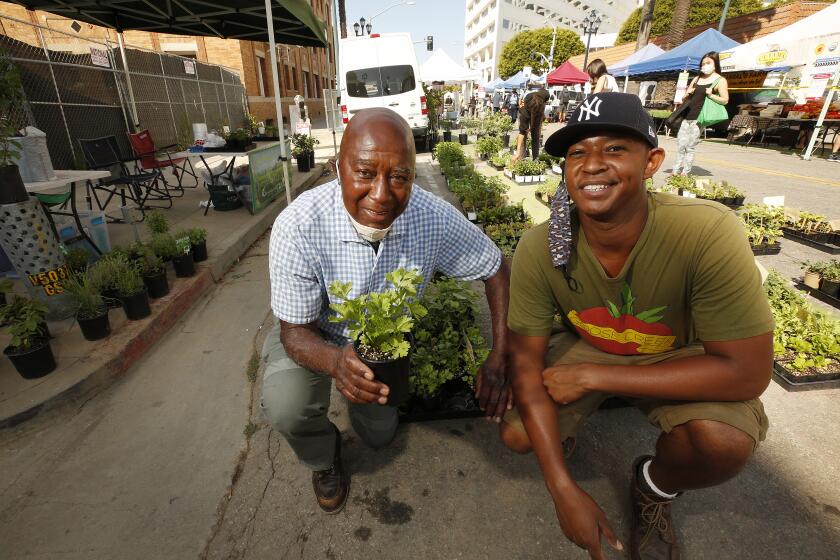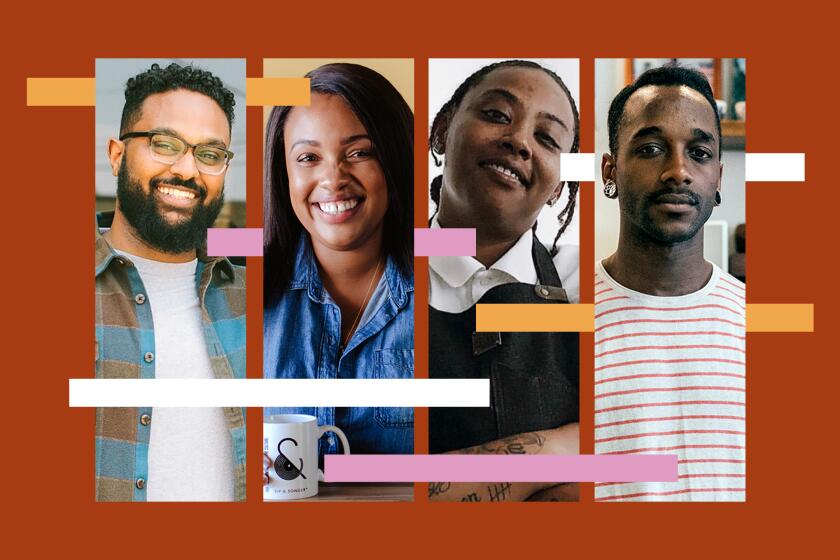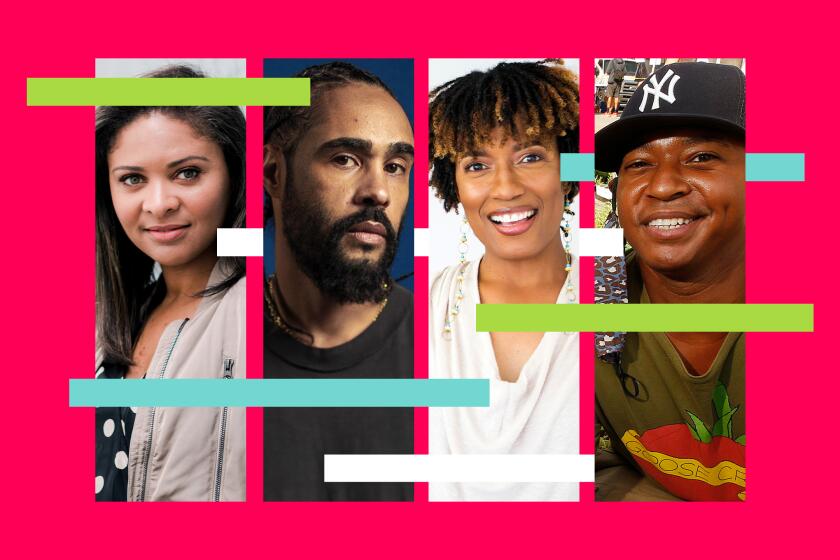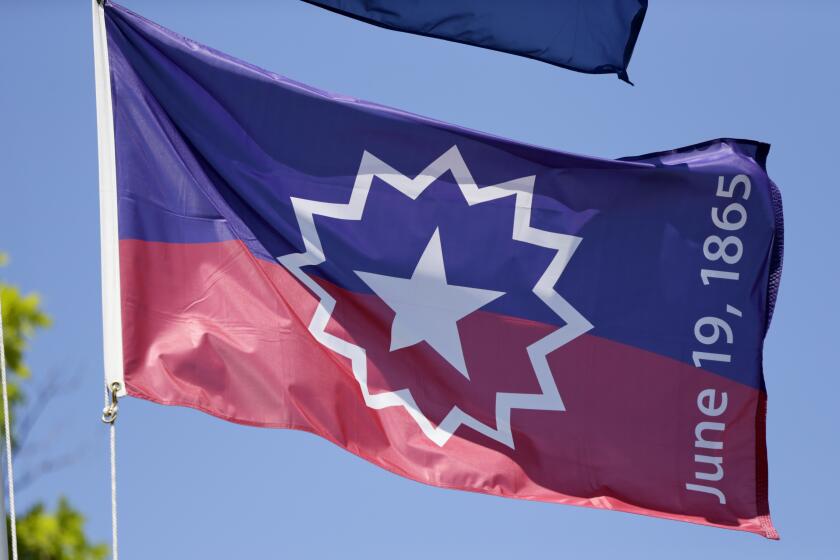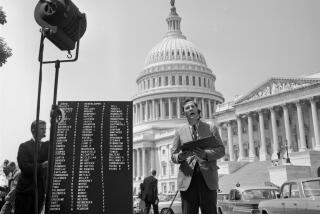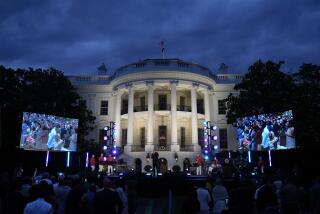Why Juneteenth is so important and why so few people know about it
- Share via
Juneteenth is Friday, June 19, a holiday that is arguably as important to our nation as the Fourth of July, since it commemorates the day in 1865 when enslaved people of Texas, then the most remote region of the Confederacy, finally learned slavery had been abolished and that they were free.
Juneteenth — a mashup of “June 19” — became a day of celebration for Black people in Texas, a tradition that slowly spread as they migrated to other states such as Louisiana and California.
Texas declared Juneteenth a legal state holiday in 1980, the first state to do so, but national awareness has been spotty, even among Black people, said Brenda E. Stevenson, professor of history and African American studies at UCLA, whose most recent books include “What is Slavery” and “The Contested Murder of Latasha Harlins: Justice, Gender and the Origin of the LA Riots.”
In Los Angeles, the end of slavery was often marked on New Year’s Day, before new arrivals from Texas brought the tradition of a Juneteenth party.
“Growing up in Virginia, I didn’t hear about it until I went to college,” Stevenson said.
But the recent demonstrations against police killings of Black Americans and growing recognition of systemic racism in our nation’s businesses and institutions has brought Juneteenth to the forefront of public awareness.
On Wednesday, New York’s governor signed an executive order recognizing Juneteenth as a paid holiday for state employees to commemorate the emancipation of slaves in the U.S. Efforts to make America‘s other Independence Day a national holiday have long stalled in Congress, although all but three states — Hawaii, North Dakota and South Dakota — have followed Texas’ lead in some way, declaring Juneteenth a state holiday or observance, according to the Congressional Research Service. (In 2003, California declared the third Saturday of June to be a state observance known as Juneteenth National Freedom Day.)
Over the past two weeks, corporations such as Twitter, Square, Nike, Target and the National Football League declared Juneteenth a paid company holiday. And others, such as historian and Lyndon B. Johnson School of Public Affairs professor Peniel Joseph, are publicly lobbying for Juneteenth to become a national holiday.
“A national holiday commemorating Juneteenth would spur not only conversation about the origins of our current racial and political conflicts, but would also prompt vitally necessary education about white supremacy and its manifestations in policies and political actions that are anti-Black, anti-democratic and anti-human,” Joseph wrote in a June 13 op-ed for CNN.
To add to the recognition, a critically acclaimed movie, “Miss Juneteenth,” becomes available for streaming Friday on FandangoNow. The movie, which debuted at the Sundance Film Festival in January, is about a former beauty queen-turned-single mom trying to groom her reluctant daughter to win the Miss Juneteenth pageant, earn a full-ride scholarship and avoid the life mistakes she made.
Jimmy Williams and his son Logan are black owners of a popular Silver Lake nursery that sells organic vegetable plants and builds gardens for the rich and famous, but that didn’t stop the police from pulling them over in their work van one day, saying, ‘We’ve had several robberies in the area.’
An additional spotlight was cast on Juneteenth last week when President Donald Trump announced he would have his first major, post-COVID-19 reelection rally on June 19 in Tulsa, Okla., the site of “the single worst incident of racial violence in American history,” according to the Oklahoma Historical Society. After a public outcry, the president said he would change the rally date to June 20 out of respect for the holiday. (He also took credit for raising awareness about Juneteenth, telling the Wall Street Journal “Nobody had ever heard of” it and adding, “I made Juneteenth very famous.”)

As for Stevenson, the UCLA professor, she plans a small family gathering for June 19. “I’ll be throwing some fish on the grill for myself and some jackfruit for my daughter, who’s a vegan,” she said, laughing.
But the most important part for her will be having some serious meal-time conversations about racism then and now. “We’ve really got to take advantage of this moment,” she said.
“I do appreciate emancipation, and I want to take a moment to thank God for it and talk about our own legacy. ... But clearly, we are a deeply racialized society. When [President Barack] Obama was elected, people said, ‘Oh, now we’re in the post-racial era,’ but that era never arrived and certainly isn’t here now.”
Here’s a look at Black-owned coffee shops in Los Angeles, inspired in part by barista LaNisa Williams and her #BlackinBrew social media campaign.
An examination of Juneteenth illustrates how deep those racist roots go, said Stevenson, who has taught at UCLA for nearly 30 years, specializing in the history of American slavery.
The lessons begin in 1862, when the Union was losing the Civil War against the Southern Confederate states. President Abraham Lincoln was looking for a way to cripple the Confederacy’s funding, Stevenson said, so he wrote the Emancipation Proclamation to free the slaves in the Confederate states, starting Jan. 1, 1863.
“The thinking was, by freeing the slaves, the Confederacy wouldn’t have enough workers to produce the cotton crops sold to England and the Confederacy wouldn’t have enough money to continue the war,” Stevenson said.
But the proclamation was more strategic than liberating, Stevenson said, since it applied only to the Confederate states. Slavery was still permitted in the border states of Maryland, Delaware, Kentucky and Missouri.
“Lincoln did not want to push the border states into the Confederacy by freeing those people’s slaves,” Stevenson said. “He had promised if they remained loyal to the United States, they could retain their slave property.”
Eventually that changed when Congress approved the 13th Amendment on Jan. 31, 1865, abolishing slavery throughout the United States. A few months later, on April 9, 1865, Confederate Gen. Robert E. Lee surrendered his troops to Union Gen. Ulysses S. Grant, marking the beginning of the end of the Civil War, which continued to be fought in remote parts of the country until its formal conclusion in 1866.
There was no internet or telephones then to spread the news, so when Union Major-Gen. Gordon Granger arrived in Galveston, Texas — the most remote outpost of the Southern slave states — on June 19, 1865, there were only unconfirmed rumors about the Emancipation Proclamation that had freed enslaved peoples more than two years earlier, Stevenson said.
But Granger’s reading of General Order No. 3 finally made it official:
Here are Black-owned restaurants, coffee shops, fitness centers, lifestyle brands and other businesses to support.
“The people of Texas are informed that, in accordance with a proclamation from the Executive of the United States, all slaves are free. This involves an absolute equality of personal rights and rights of property between former masters and slaves, and the connection heretofore existing between them becomes that between employer and hired labor. The freedmen are advised to remain quietly at their present homes and work for wages. They are informed that they will not be allowed to collect at military posts and that they will not be supported in idleness either there or elsewhere.”
One has to wonder how much was heard by the crowd after “all slaves are free,” but that’s how Juneteenth was born, Stevenson said.
“There was a lot of celebration, a lot of singing of songs and giving out prayers of thanks to God” among the newly freed slaves, Stevenson said, but liberty brought nothing else.
Yes slaves were freed, Stevenson said, “but a lot of people stayed on the plantations because they had nowhere else to go. They had no land, no housing, no work tools, seeds or work animals.”
Plantation owners had little desire to pay for the labor they had once gotten for free, Stevenson said. “That’s when you see sharecropping developing and renters having to give up what they earned to the landowner.”
The result being that while people were set free, they remained in economic bondage to their former owners.
And then there was the deeply entrenched belief of white supremacy, a mindset carefully nurtured for generations, to justify the enslavement of Black people and other people of color, Stevenson said.
“The whole mythology about Black incompetence and inferiority was very ingrained. They [slave-holder society] saw this as a rule of natural law, and it wasn’t about to flip because of a proclamation,” Stevenson said.
Slaveholders forced these beliefs onto their children at an early age, Stevenson said, “to the extent that they sent them away to school to remove them from the companionship of Black (slave) children. They had to teach them their ‘friends’ on the plantation were inferior, and someday you’re going to be their master. It was a real indoctrination. This was very seriously enforced, and you could not, as a white person, act otherwise if you did not want to be ostracized.”
One wonders how different our history — and race relations — might have been if the entire nation came together to celebrate our second Independence Day, the end of legal human bondage in the United States.
Now, 155 years later, we have a lot of catching up to do, Stevenson says, which makes national conversations about racial injustice and inequality so important.
“Racism is deeply rooted in American culture and ideology,” she said, “and we just have to keep digging deeper and deeper until those roots are out.”
This year’s Juneteenth celebration is different: It comes as America wakes up to the illusion of the liberation of Black people.
More to Read
Sign up for The Wild
We’ll help you find the best places to hike, bike and run, as well as the perfect silent spots for meditation and yoga.
You may occasionally receive promotional content from the Los Angeles Times.
